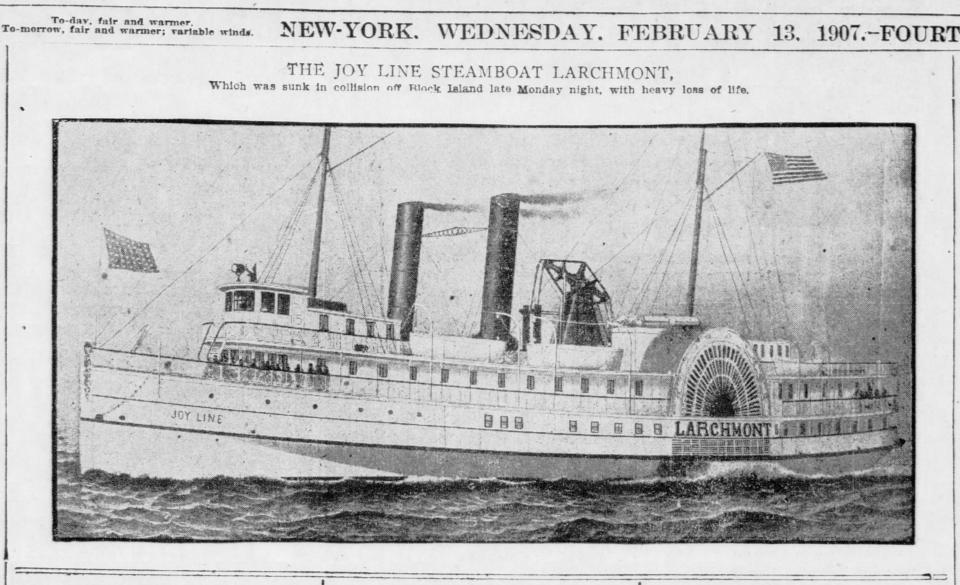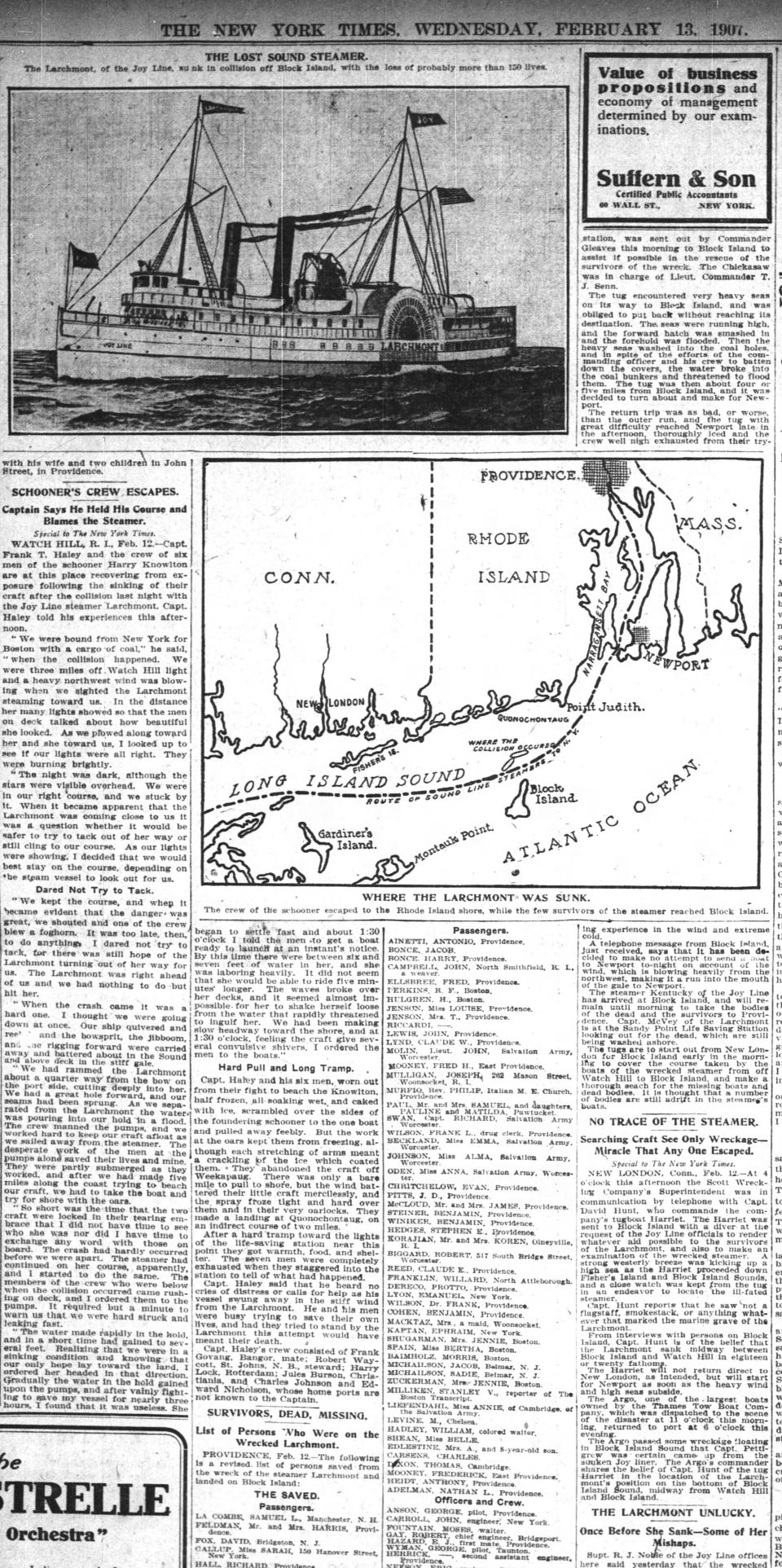Righting the past: Ezra Gary, professional mariner, dies in tragic shipwreck
Editor’s note: This is the fourth in a series of historical obituaries written today to honor the men and women of the past who were denied the honor at the time of their death because of discrimination due to their race and/or gender.

Ezra D. Gary of Pensacola died on Feb. 12, 1907, while working aboard the steamship Larchmont. The previous evening, the passenger ship left Providence, Rhode Island, and was in Block Island Sound bound for New York, New York, when it collided with the schooner Harry Knowlton. Gary was one of over 150 passengers and crew who perished in the disaster. He was 25.
Mr. Gary was born in Milton, Florida, in August 1881, the first child born to William Gary and Octavia Goodlow. In 1882, his parents married and had a second son, Charles. Living close by or with their maternal grandparents, George and Georgiana Goodlow, Ezra and his brother may have inherited a love of the water from their grandfather, who worked as a seaman. Their community was surrounded by African American men who worked in the maritime industry as ferrymen, carpenters and boatmen.
Gary’s mother divorced, married Richard Merrill in 1885, and welcomed two more children, Mamie in 1886 and George in 1887. By the late 1880s, they had moved to Pensacola’s Belmont DeVilliers neighborhood, blocks from the thriving port that saw over 500 vessels sail in and out of Pensacola Bay every year.
What is 'Righting the Past' project?Their history wasn't just forgotten, it was buried. Today we tell their stories.
Righting the past: War veteran and prominent citizen, John Sunday is dead at 86
Righting the past:Donald Reed Sr., a leader in Pensacola business, life and community, died at age 86
By the age of 16, Gary had entered the maritime service as a steward, joining hundreds of Black sailors, watermen and longshoremen who contributed significantly to the economic growth and development of the Port of Pensacola. The 1898 Pensacola City Directory identified Gary as a cabin boy. He worked hard and prospered. Two years later, while his mother and grandmother worked as seamstresses, Gary and his brother sailed as stewards.
Perhaps having heard about his grandfather’s adventures; having read about the heroic war stories of early African American seaman like Crispus Attucks and Paul Cuffe during the Revolutionary War, or the whaling success of Captain Absalom Boston; or seeking his own way, Ezra left Pensacola in the early 1900s. He worked for the Joy Line Steamship Company of New York on the Larchmont, a passenger and cargo steamship.
The calm streams, creeks, bayous and bays of his childhood in Northwest Florida would have been a stark difference from the exciting vast bays and sounds of the North Atlantic Ocean. But by now, Gary had almost a decade of maritime experience, his knowledge of service now bolstered by a generational passion and inheritance of the water. At the same time, Jim Crow increasingly gripped the city, pushing thousands of Black Pensacolians to seek better opportunities elsewhere. Gary joined this exodus. He went north and to sea.
On the cold Monday evening of Feb. 11, the Larchmont departed Providence with a crew of 50, approximately 150 passengers, and a cargo of freight. There could have been more; while the passenger ship was licensed to carry up to 600 passengers, it only had enough life-saving equipment to carry 225. The weather, though freezing, was calm and fair.

Gary served in the steward department alongside 20 other African American men who worked as waiters, cooks and cabin boys. His title, pantryman, denoted that he had charge of the food and goods stored for the kitchen that fed the passengers and crew. The ship’s captain, George McVey, later noted how “many of the colored men have been employed on steamers for many years and were proficient.”
Little did Gary know that their proficiency would be tested just four hours into their planned 13-hour voyage. Around 11 p.m., with most of the passengers asleep and many of the steward crew in their bunks, a lookout alerted the ship’s pilot to the approaching lights of the schooner Harry Knowlton. As a steam-powered vessel, the Larchmont was legally responsible for adjusting its course, though the sailing vessel Harry Knowlton also tried to avoid a collision. It was too late for both. According to the subsequent maritime investigation, the steamer struck the schooner and nearly cut it in two.
Righting the past: Rev. L. B. Croom, civil rights activist, dies at 73
Righting the Past: James Goldstucker, famed baseball manager and businessman, dead at 75
The on-duty crew attempted to wake the sleeping passengers and crew and give them life vests, despite the head steward claiming that everything was OK. The ship’s engines, disabled in the collision, went out. Steam from dislodged pipes or damaged boilers filled the air. The demoralized, terrified crew was unable or unwilling to carry out orders. Over 150 souls entered the frigid water as 30- to 40-mile-an-hour winds howled in the pitch-black night. Only 17 survived.
Captain McVey escaped on the first life-saving boat that left the sinking Larchmont and was among the first to reach the shore. He was never charged with incompetence or misconduct. The ship’s pilot, who died in the shipwreck, was posthumously blamed for the collision.
Gary never had his say in the matter.
The collision, called by many the “Titanic of New England,” made headlines around the country, including the Pensacola Journal. Reading news of the disaster, Gary’s grandmother sent a telegram to the steamship company asking about her grandson’s fate. The swift reply told of his demise. Newspapers soon reported his death, misspelling his surname Gerry and Geary. As the Pensacola Journal reported: “E.D. Gerry, colored, perished in the Larchmont disaster.” His body was recovered. His grandmother intended to have his remains interred in the family plot in the Milton Keyser Cemetery, but it was not to be. Gary was buried with many other victims of the Larchmont disaster in the North End Cemetery in Providence, Rhode Island.
Gary’s death largely went unnoticed, except for a passing mention of his funeral service where his pastor defended the disgraced Captain McVey. Gary’s life of service to others deserves more.
His life is remembered today by his nephew, Alfred Merrill, a host of great-nieces and -nephews, cousins, and a grateful Pensacola and Milton community who salute his legacy, honoring their sea-loving ancestors.
Gary’s life inspired the Ezra Gerry Museum and Research Center, now in development by the Kukua Institute. It will be a place to discover and celebrate his life and contributions, along with the many other residents, businesses, history and culture of the Historic Belmont DeVilliers neighborhood.
This article originally appeared on Pensacola News Journal: Righting the past: Ezra Gary, professional mariner, dies in shipwreck

